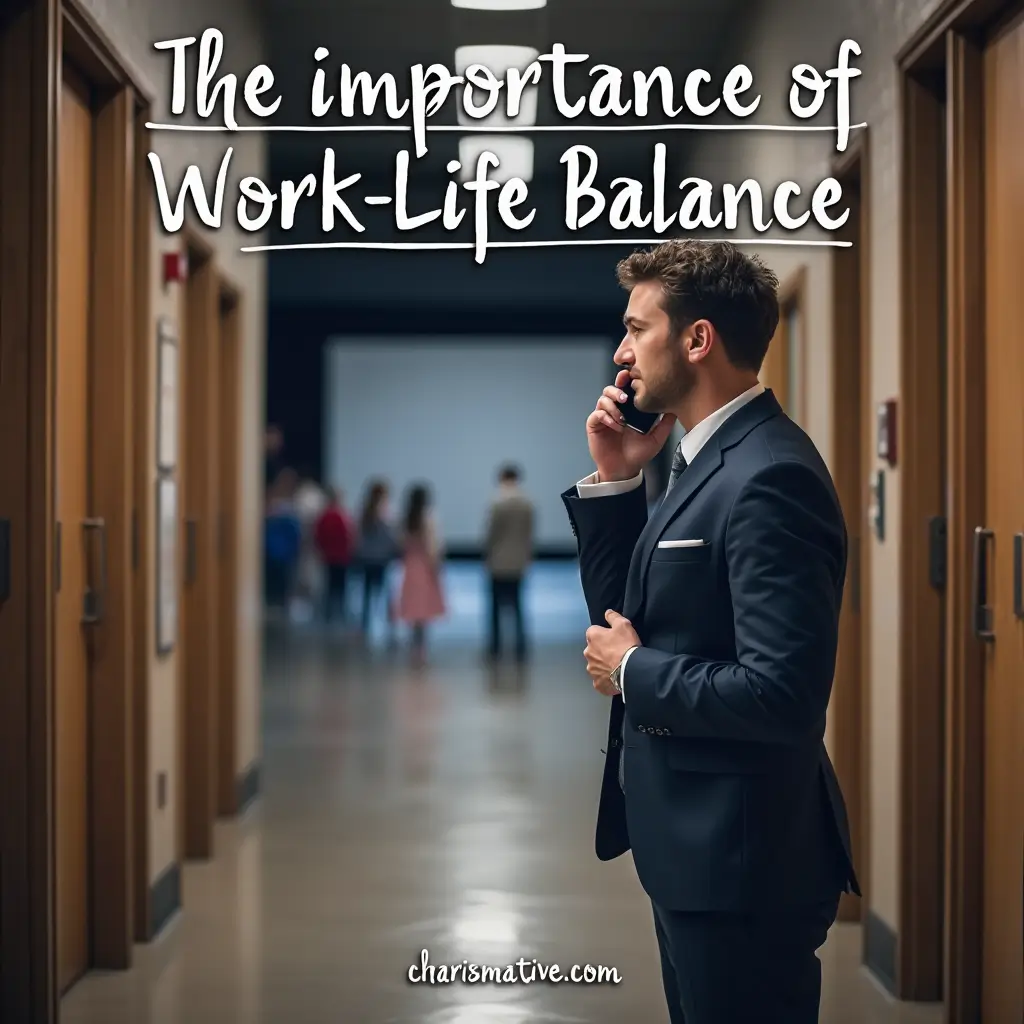Table of Contents
Let Me Tell You Why the Importance of Work Life Balance Is Bigger Than You Think
The importance of work life balance hit me hard Last week, I was at my kid’s school play when my phone buzzed. Work email. Then another. Then a “quick question” that turned into a 20-minute phone call in the hallway.
I missed my daughter’s solo.

That night, I realized something: work-life balance isn’t just a nice idea anymore. It’s survival.
And honestly? Most of us are failing at it badly.
The need for work-life balance hit me like a truck that day. Not because someone told me it mattered, but because I saw what happens when you ignore it completely.
The Importance of Work Life Balance has become the topic everyone talks about.
You’ve probably noticed that work-life balance is everywhere now. News articles, LinkedIn posts, company meetings – everyone’s suddenly an expert.
But here’s what’s wild: people actually changed their priorities.
During COVID, something shifted. People sat at home for months and asked themselves hard questions:
- Why am I working 12-hour days?
- When did I last have a real conversation with my spouse?
- What am I actually doing with my life?
The answers weren’t pretty.
Then this study by Aviva blew my mind: 41% of people now choose jobs based on work-life balance. Only 36% pick based on salary.
Before 2020? It was completely backwards. Money first, work-life balance second.
Even as living costs explode, more people are saying, “I’d rather earn less if it means I get to be happy.”
That’s how essential balance between life and work has become.
What’s Really Destroying the Importance of Work Life Balance

It’s not just long hours anymore. The real enemy of work-life balance? Technology.
Your typical day probably looks like this:
- Check work emails while drinking coffee
- Answer Slack messages during lunch
- Take “just one quick call” during dinner
- Scroll through work stuff before bed
My brother told me he checks work emails while his kids are telling him about their day. While his kids are talking to him.
The importance of work life balance becomes clear when work never stops.
Your phone buzzes with work notifications 24/7. Your boss can reach you on vacation. Colleagues expect instant responses to everything.
The pressure is insane. When your manager sees you read that 10 PM email, there’s this unspoken expectation that you should respond. Nobody says you have to, but the pressure is there.
Even people who love their jobs are drowning. You can be passionate about your career and still desperately need work-life balance.
Smart business leaders are finally getting it. They’re realizing that maintaining a healthy work-life boundary isn’t just about keeping employees happy – it’s about staying competitive.
Why the Importance of Work Life Balance Matters for Business
I’m not here to give you a fluffy speech about feelings.
I’m here to talk about money and results.
Companies that prioritize work-life balance simply perform better. Here’s why:
- People work harder when they don’t hate their jobs
- They make fewer mistakes when they’re not exhausted
- They stick around longer when they feel respected
- They become your biggest advocates instead of secret complainers
Work-life balance attracts the best talent. Especially younger workers who watched their parents burn out and said “absolutely not.”
That’s why the importance of work life balance in business strategy can’t be overstated.
The importance of work-life balance isn’t just about being nice. It’s about being smart with your business.
The Core Reasons Behind the Importance of Work Life Balance
1. Work-life balance keeps people healthy
Poor work-life balance doesn’t just make people tired. It makes them seriously sick.
A University College London study looked at office workers who regularly worked 3+ extra hours daily. They had a 60% higher risk of heart problems.
We’re talking about:
- Heart disease
- Stroke risk
- Mental health problems
- Getting sick constantly
- Breathing issues
When you prioritize work-life balance, people stay healthier. Healthy people show up to work. Sick people don’t.
Simple equation.
2. Work-life balance creates engagement
Companies that value a strong personal–professional boundary see 52% better performance than companies where people are miserable.
The engaged companies increased profits by 19.2%. The disengaged ones? Profits dropped 32.7%.
But here’s my favorite part: employees with good work-life balance are 2.5 times more likely to stay late when you really need them. But only when it actually matters.
When people feel free to enjoy their lives outside work, loyalty grows.
3. How the Importance of Work Life Balance prevents burnout
Stress happens. That’s life. But burnout? That’s what happens when work-life balance completely falls apart.
Burnout occurs when someone feels totally overwhelmed and can’t keep up anymore. It usually happens when work bleeds into every single part of their life.
The good news? Avoiding burnout starts with clear separation between work and personal time.
You just need to let people actually disconnect. Really disconnect. Not “answer emails from the beach” disconnect.
4. Having clear boundaries between work and rest sharpens focus
When people have good work-life balance, something amazing happens.
They can actually focus on what they’re doing in the moment.
This means:
- Better work performance during work hours
- Better family time at home
- Better sleep at night
- Better everything
Healthy separation between work and life allows people to be fully present.
Real-World Strategies That Support the Importance of Work Life Balance.
Enough theory. Let’s talk real solutions for better work-life balance.
Make vacation time a must to protect personal well-being.
Vacations aren’t luxuries. They’re critical for recharging and separating from work.
People need to completely unplug, do something fun, and remember what life is about outside of work.
But here’s the crazy part – lots of people don’t use their vacation days. They’re terrified of looking lazy.
The American Sociological Association found that more vacations dramatically improve work-life balance and reduce stress.
Solution: Use it or lose it policies. Make taking time off mandatory for good work-life balance.
Create daily breaks that encourage personal recovery.
Can’t do longer vacations right now? Start with better daily work-life balance.
Nobody should stare at screens for 8 straight hours. That destroys work-life balance instantly.
ideas that actually help restore work-life health:
- Phone-free break rooms where people can actually relax
- Walking meetings (surprisingly effective for work-life balance)
- Coffee breaks without laptops
- Encourage short walks around the block
I know a company with a “no devices” lunch room. People have real conversations there. It’s revolutionary for work-life balance.
Ask employees what work-life balance means to them
Want to improve work-life balance at your company?
Just ask people what they need.
Try these questions about work-life balance:
- “What’s making it hard to disconnect from work?”
- “What would better work-life balance look like for you?”
- “What’s one thing we could change to help your work-life balance?”
You might be shocked by how simple the solutions are. Listening to your team shows you understand the importance of work life balance from their perspective.
Lead by Example: Model the Importance of Work Life Balance
If you’re destroying your own work-life balance, your team will too.
I don’t care if you love working at midnight. When you send that late-night email, your employee thinks they should respond immediately.
Some companies now have email curfews. No work messages after 7 PM or weekends unless it’s a real emergency.
France has a “Right to Disconnect” law that protects work-life balance. Maybe we should pay attention.
Your work-life balance habits become your team’s work-life balance habits.
The Bottom Line on the Importance of Work Life Balance
Most of us spend way too much mental energy thinking about work. Even during personal time.
I was having dinner with my family last weekend, physically there but mentally reviewing my Monday meetings. My wife asked if I was even listening.
She was right. My work-life balance was terrible.
Work-life balance isn’t about working less. It’s about being human while you work.
When people achieve real work-life balance, everyone benefits:
- Employees are happier and more productive
- Companies get better results and keep great people
- Families get parents who are actually present
- Communities get people with energy to contribute
The value of protecting life outside work isn’t complicated. But it does require making real changes.
Companies that prioritize work-life balance will attract the best talent. The ones that ignore work-life balance will keep losing good people.
The question is: do you understand the importance of work-life balance enough to actually do something about it?
Because I promise you—your people are desperate for better work-life balance. If you truly grasp the importance of work life balance, you’ll start making changes that matter.

